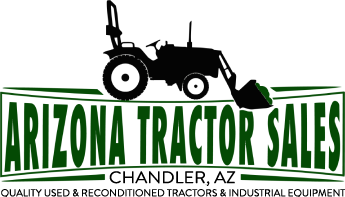Forklift Accident Prevention
 In the hustle and bustle of a workday, safety has to be a primary concern on everyone’s mind. Especially when you’re dealing with heavy equipment like forklifts, the importance of safe operation is paramount. The sad fact is that forklift accidents remain a serious problem in the United States, and some of these accidents are - tragically - fatal. If you’re someone who regularly operates a forklift, you’ve already received extensive training on safe operation, but it’s always good to refresh your knowledge.
In the hustle and bustle of a workday, safety has to be a primary concern on everyone’s mind. Especially when you’re dealing with heavy equipment like forklifts, the importance of safe operation is paramount. The sad fact is that forklift accidents remain a serious problem in the United States, and some of these accidents are - tragically - fatal. If you’re someone who regularly operates a forklift, you’ve already received extensive training on safe operation, but it’s always good to refresh your knowledge.
At Arizona Tractor Sales in Chandler, Arizona, we’ve put together this guide to help you review your own training on forklift safety, and maybe even learn a few new tips and tricks. If you have questions or want information on purchasing equipment, please contact our expert team. We proudly serve customers across the Western United States.
Causes of Forklift Accidents
To learn how to prevent future forklift accidents, you need to understand the root causes of these accidents and apply that knowledge to your existing training. The fact is that training deficiencies, a lack of focus or paying attention, or just careless or reckless operation, all contribute to some of the worst accidents that can happen. Lack of supervision, oversight, or safety enforcement can also be a problem, and if you feel like your workplace lacks the proper oversight, you should talk to your supervisor or safety coordinator on site to ensure that safety protocols are brought up to snuff.
Accidents can also be caused by problems beyond lack of training or oversight. If your warehouse is designed with a lot of blind corners, you’ll have more trouble avoiding potential obstacles. If your warehouse is really loud, you might not be able to hear your machine’s engine or be able to notice any mechanical problems that can be identified by sound. It’s critical to keep your forklift properly maintained and serviced, not just to prevent work stoppage from a breakdown, but to help limit the possibility of accidents caused by mechanical failure. In any workplace, you have to pay attention to your fellow workers and ensure that they are safe while you’re operating your machine.
Check Yourself
Whether you operate a forklift directly or if you’re a supervisor or another worker that does work around forklifts, you have to check your own behavior and practices to ensure that you’re contributing to a safe workplace. Everyone who works around forklifts must have the proper training, and nobody under the age of 18 should be allowed to drive a forklift. Make sure you’ve got the basics down: drive at a safe speed, don’t drive with an elevated load, and - obviously - avoid horseplay and other stupidity. Make sure the whole worksite is properly supervised and that everyone is adhering to all safety protocols.
Check Your Machine
It’s critical to make sure your machine is in top condition at all times. Check that the fork and the hydraulic systems are properly functioning. Go over the brakes, steering, transmission, and be aware of your exhaust emissions. A real hazard of forklift operation in an indoor environment is carbon monoxide poisoning, so you need to be sure your worksite is properly ventilated. If you perform required maintenance on your machine on a regular basis, you can help avoid a lot of accidents.
Check your Environment
If your worksite has challenges like excessive noise, obstructed line of sight and blind corners, or other workers moving through the site in erratic and unpredictable ways, then you have to adjust your safety protocols accordingly. For example, if your line of sight is obstructed, you might try reversing the forklift and backing up to your destination. If you can’t see the edge of a loading dock (or in any other low-visibility situation), ask for a spotter to help guide you in. You can also help create a safer environment by, for example, installing mirrors around blind corners, or separating forklift and foot traffic into different lanes.
The key to safety lies with you, and with every other worker at the site. We hope this brief guide has helped refresh your training and knowledge about forklift safety and maybe even taught you a few new things to help keep you safe. And if you have further questions or want to browse our selection of forklifts for sale, please contact us at Arizona Tractor Sales, and we’ll be happy to help you.

